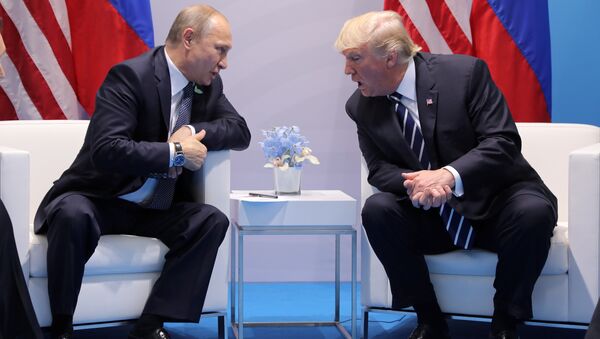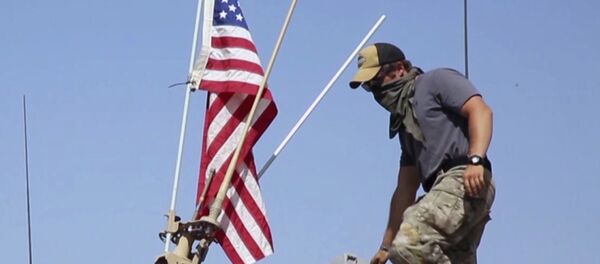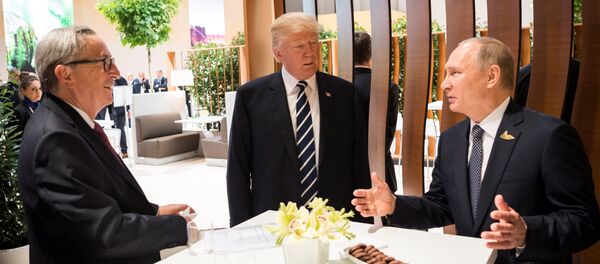The much-anticipated first meeting between Russian President Vladimir Putin and US President Donald Trump took place on Friday on the sidelines of the G20 summit in Hamburg. The meeting was also attended by Russian Foreign Minister Sergei Lavrov, who described it as "very constructive," and US Secretary of State Rex Tillerson, who said the two leaders "connected very quickly" and that there was a "a very clear, positive chemistry" between them.
The talks had been scheduled to last around 30 minutes, but in the event the two leaders talked for over two hours, discussing a number of issues, including the Syrian crisis and Moscow's alleged interference in the recent US presidential vote.
Dr. James Brown, Associate Professor at Temple University, Japan, agreed "constructive is perhaps the right way to describe" the meeting.
"If you look at the body language of the two leaders, it seemed to be deliberately positive. Now, we thought that perhaps this meeting might just be an initial get-to-know you type of meeting, but in actual fact they also succeeded in reaching some concrete agreements."
The positive atmosphere at the meeting was a contrast to some combative statements the US President had made on the eve of the talks. On Thursday, he had accused Russia of "destabilizing activities" in Ukraine and of providing support to hostile regimes including Syria and Iran."
"I think those comments from President Trump were really just a bit of diplomatic balancing. He knew that within the US, he was going to receive criticism for showing a friendly attitude toward President Putin in his meeting and therefore he sought to pre-empt this criticism by making a few more tougher comments about Russia in advance," Brown explained.
On Saturday, US Secretary of State Rex Tillerson announced that, during the meeting, the two leaders had reached a "defined agreement" about a ceasefire in southwest Syria, which he welcomed as "our first indication of the US and Russia being able to work together in Syria."
The agreement is "clearly a major achievement, given that it's just their first meeting," but it remains to be seen how it will work in practice given the failure of previous ceasefires and the limited territory it will cover, Brown said.
"[It is] clearly a positive step but we shouldn't get carried away, this is not going to be the end to the Syrian conflict unfortunately."
"It's very difficult for the two sides to monitor and enforce it, previous ceasefires have failed in the past. It's also notable that this is essentially an agreement between Russia and the US, the Syrian regime are not direct signatories to this agreement nor are the opposition forces. So, as I say it's a positive step but as a say quite a minor one."
The two Presidents also discussed cybersecurity issues including the fight against terrorism, organized crime and hacking. They agreed on the formation of a joint working group to tackle issues of cybersecurity, Russian Foreign Minister Sergei Lavrov revealed.
"Cyber-weapons are a growth area, it's also very hard to determine who is behind the cyber-attack and that means that it's especially difficult to deter them. So I think that instead this framework is rather more symbolic, it's an indication that the US and Russia recognize that cyber-security issues are going to remain an important concern and they want to find some sort of way of conducting dialogue on this but it's certainly not a way of resolving it 'once and for all.'"
While Trump has expressed a desire to lift sanctions against Russia and to have a better relationship with Moscow, his room for maneuver is limited by the US Congress and media.
"We have to take into account that the Presidency in the US is just one branch of the US government; it's held in check by the legislature and the judiciary and Congress has made it abundantly clear that they are opposed to any reduction in sanctions. There is also the ongoing legal investigation. So, under these conditions, even though Trump would like the sanctions to be lifted, he knows that if he were to try and do it he would receive even more vehement criticism within the US than he is already receiving."
While the constructive meeting between Trump and Putin shows that the two leaders can work together on a personal level, "we have to take into account domestic US politics" when assessing the potential for a rapprochement.
"The criticism of the Trump administration, the concerns about the alleged Russian interference in the election – those things are not going to go away and that means that in the near term I don't see any possibility of a major step forward in US-Russian relations," Brown concluded.





